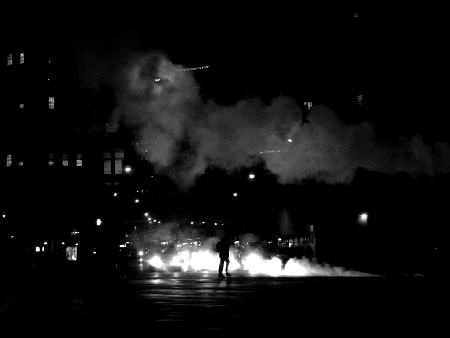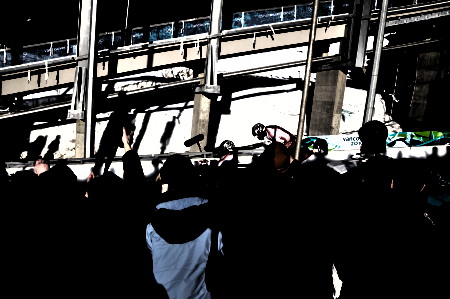I’m back.
David Graeber recently threw down a new piece / excerpt, called The Practical Utopian’s Guide to the Coming Collapse. It’s got lots of good things to say, namely that revolutionary activity is the driving force in history. This is an important thing to say when suffocated with the wet blanket of complacency that coddles the overdeveloped world. The impact of an event is not always in the here & now, but has ripple effects. These ripple effects can only be discerned by studying the waves that past revolutionary events have made in the fabric and institutions of the social order. This is what Graeber does, and he makes some excellent points: that, for example, the French revolution, even as it was co-opted, nonetheless led to various modern democratic institutions including universal education in the West (even if they were “distributed” by Bonaparte).
But there are two critiques of Graeber’s piece I want to advance, in the spirit of adding more to this discussion from the same side of the fence, as it were:
(1) For Graeber, the big event of the ’60s was Paris ’68. I’m going to say that May ’68 is a nice bedtime tale that boomer French Lefties tell their kids. A counter-history is available here: May ’68 is the echo of the early 1960s Algerian riots in Paris in which dozens of activists were killed and dumped in the Seine — that’s the revolutionary moment. Not May ’68. Why? I’m not trying to find the “real” revolution, though it may seem so. But I can’t help but notice a white streak in Graeber’s analysis that passes over struggles for Civil Rights and anti-colonial revolts against European and imperial empire. Graeber focuses on white, bourgeois struggles for class equality within empire, where brief moments of “playing revolutionary” resulted in few deaths because nothing really was at stake, and where, after everyone got their catharsis on, plus ça change, plus c’est la même chose. By this I mean: all the soixante-huitards got to return to society. They got their jobs back, went back to university. They even got a new, radical university: Vincennes. A few had a rough time, but in the end (Cohn-Bendit!) they became part of the party system and came into power with Mitterand. They weren’t ghettoized, incarcerated, hunted down, strangled, dumped in the Seine — like the pieds-noirs were. That’s my point. And that’s also why we saw the ban lieu riots a few years back: because shit didn’t change much for the others.
Let’s look at blowback. What did ’68 result in? Yes, there are all the good things, Mitterand came in, they got rid of the cobble stones, there were “concessions”. But the big blowback of the ’60s in general? The ’60s struggles led to (as in fed back into) a much more complete and comprehensive system of consumerism designed to sell “revolutionary” values back to the white kids. Silicon Valley and what on Nettime was critiqued as “the California Ideology” is part of this: utopian technocapitalism led by cyberhippies. iRevolution from Apple. Once the “personal became political” it was sold & packaged to the boomers as all manner of retreat-oriented lifestyle products. Then this strategy was marketed worldwide. The Situationists were right; they did warn us. We all know this of course. It’s precisely what we went into the streets for in the ’90s, all Adbustin’ & symbol-wreckin’, following innovations in graffiti 15 years previous. But I digress.
Where are we today with ’68? Well, some of the former brick-tossers are theorizing Being & Event and claiming to be Maoists on the lecture circuit — let’s compare that to where the black revolutionaries ended up: either assassinated or incarcerated during the ’60s (Malcolm X, MLK Jr., Edgar Mevers, numerous Black Panthers, Mumia Abu Jamal, etc.) or driven to the breaking point by COINTELPRO (notable exception: Angela Davis). Power is unevenly distributed along lines of “race”. So we need to look where it has been handed down with the greatest force & violence — because that is where the State saw the most disruptive revolutionary activity coming from.
(2) I also want to make another point: that downplaying certain trajectories, such as US military operations, doesn’t help our understanding of the impact of revolutionary events. Graeber says that the various events of the ’60s kept the US out of major conflict for 30 years until 9/11. This claim ignores the changing strategies of a globalized military. The US simply moved their military operations into covert ops, funding paramilitary and fascist organizations throughout the Middle East and Latin/South America. The military supported Contra drug lords to channel ghetto crack back into the US — why? To shut down black revolutionary activities by creating structural impoverishment, crime, and addiction (check The Black Power Mixtape above). The US also went on a spree of illegal strike force assaults worldwide thanks to the real lessons they learned from Vietnam — of the Colonel Kurtz variety. My point here: while Autonomia in Italy were theorizing disappearance & exodus, the US military was practicing it. The US didn’t step back from military engagements: it just changed the strategy and re-packaged them for home consumption. Just like the military used Nazi scientists & their rocket technology to build the space program they put to good use military expertise in terror-tactics learned from Vietnam for “surgical” operations, abroad and at home by militarizing local police forces to surpress black urban ghettoes so that Watts would never happen again. But it did, of course: the 1992 LA riots, leading to increasing militarization of the police, suspension of civil liberties, and the surveillance NSA State that the US is today. Yes: I am suggesting a counter-history here. That it is not the reactionary response to 9/11 that created the surveillance state. The framework was already in place to control insurgent populations, namely the large number of disenfranchised African Americans. What 9/11 did was simply allow the State to sell the loss of civil liberties to its citizens as the “price of freedom”: it was the cover to make public what was already going down.
So while I like the theses put forward here by Graeber in their general form, they could be more powerful, and convincing, if they dealt with the revolutionary activity around Civil Rights, anti-colonial revolts, and — in the underdeveloped world — slave insurgencies. Because these are the critical points of struggle. Critical because they concern anti-slavery.
No pep talk should be erasing race from the narrative or limiting an understanding of revolutionary activity to a few Western, primarily white, hotspots. The struggles against enslavement and dehumanization should not only be “included”, but understood as the more powerful side of the equation — especially where such struggles refuse the Enlightenment values of white humanism. Because there is a macro-counter-history to that of the ongoing progress narrative of the French revolutionary subject under which Graeber’s piece has been inscribed.
As Ian Baucom argues, it is not the French revolutionary subject that is the birth of the modern subject. The “birth of man” requires its condition of possibility: the $lave, the ideal commodity form. It is to slave revolts and its insurgencies and anti-colonial revolutions that we need to turn. Why? Because the struggle is doubled, against slavery but also against the white narrative of Enlightenment humanism that instituted and produced modern slavery in the same moment that it invented the revolutionary citizen.











 RT
RT 